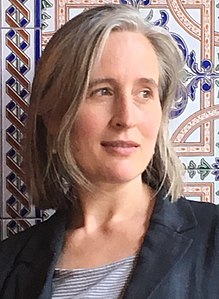Alice Crary | |
|---|---|
 Crary in 2017 | |
| Born | 1967 (age 56–57)[2] Seattle, Washington, U.S. |
| Education | Harvard University (BA) University of Pittsburgh (PhD) |
| Notable work |
|
| Awards |
|
| Era | Contemporary philosophy |
| Region | Western philosophy |
| School | |
| Doctoral advisor | John McDowell |
| Other academic advisors | Stanley Cavell, Hilary Putnam |
Main interests | Moral philosophy, philosophy and literature, epistemology, feminist philosophy, feminist epistemology, conceptualism, animal ethics, disability studies, The Frankfurt School, objectivity |
Notable ideas | Wider objectivity and rationality; critical animal theory; All human beings and animals are inside ethics |
| Website | www.alicecrary.com |
Alice Crary (/ˈkrɛəri/; born 1967) is an American philosopher who currently holds the positions of University Distinguished Professor at the Graduate Faculty, The New School for Social Research in New York City and Visiting Fellow at Regent's Park College, University of Oxford, U.K. (where she was Professor of Philosophy 2018–19).
Crary works in the fields of moral philosophy, feminism, animal ethics, and Wittgenstein scholarship. She has written about cognitive disability,[3] critical theory,[4] propaganda,[5] nonhuman animal cognition,[6] effective altruism,[7] and the philosophy of literature and narrative.[8] Her work is especially influenced by Cora Diamond,[9] John McDowell, Stanley Cavell,[10] Hilary Putnam, bell hooks,[11] Kimberlé Crenshaw,[11] Charles W. Mills, and Peter Winch.
Crary's first monograph, Beyond Moral Judgment,[12] discusses how literature and feminism help to reframe moral presuppositions. Her Inside Ethics[13] argues that ethics in disability studies and animal studies is stunted by a lack of moral imagination, caused by a narrow understanding of rationality and by a philosophy severed from literature and art.[14][15][16]
Crary's work on feminism is critical of standard views of objectivity in analytic philosophy and post-structuralism. In her view, both traditions mistakenly conceive of objectivity as value-neutral, and thus incompatible with ethical and political perspectives.[11] According to Crary, these "ethically-loaded perspectives" invite both cognitive and ethical appreciation for the lives of women, in ways that count as objective knowledge.[17] Like her moral philosophy, her feminist conception of objectivity is informed by Wittgenstein, who she understands as proposing a "wide" view of objectivity: one in which affective responses are not merely non-cognitive persuasive manipulations but reveal real forms of suffering that give us a more objective understanding of the world.[18]
Crary is associated with the so-called "therapeutic"[19] or "resolute"[20] reading of Wittgenstein. In her co-edited collection of essays of such readings, The New Wittgenstein, her own contribution argues against the standard use-theory readings of Wittgenstein that often render his thought as politically conservative and implausible.[21] Since then, she has contributed to numerous collections of Wittgenstein scholarship, including Emotions and Understanding[22] and interpretations of Wittgenstein's On Certainty.[23]
Crary has promoted (e.g., in her 2024 Cambridge Union opposition[24]) the view that humans and animals have moral worth above and beyond any quantitative valuation.[25] This view is further expounded in the 2022 monograph Animal Crisis: A New Critical Theory co-written with Lori Gruen.
Crary frequently participates in and organizes events for public discussion,[26][27][28] such as public debates on the valuation of life[29] and the treatment of animals and the cognitively disabled.[30][31][32] She has also written for the New York Times.[33][34]
Crary has contributed to international educational activities focusing on the intersection of philosophy with critical theory and political philosophy. These include summer philosophy workshops at Humboldt University in Berlin, Germany, the Transregional Center for Democratic Studies/New School for Social Research Europe Democracy and Diversity Institute in Wroclaw, Poland,[35] and the Kritische Theorie in Berlin Critical Theory Summer School (Progress, Regression, and Social Change) in Berlin, Germany,[36] which she co-organized with Rahel Jaeggi.
Crary was a 1983-4 exchange student with Youth for Understanding in the southern German town of Achern. She was also a national champion rower at the Lakeside School (Seattle) in Seattle, Washington and placed 6th in the Junior Women's Eight at the 1985 World Rowing Junior Championships in Brandenburg, Germany.[37] In the 1980s, after studying liberation theology with Harvey Cox at Harvard Divinity School, Crary researched Christian base communities in southern Mexico and Guatemala. In the early 1990s, she was a teacher at the Collegio Americano in Quito, Ecuador.